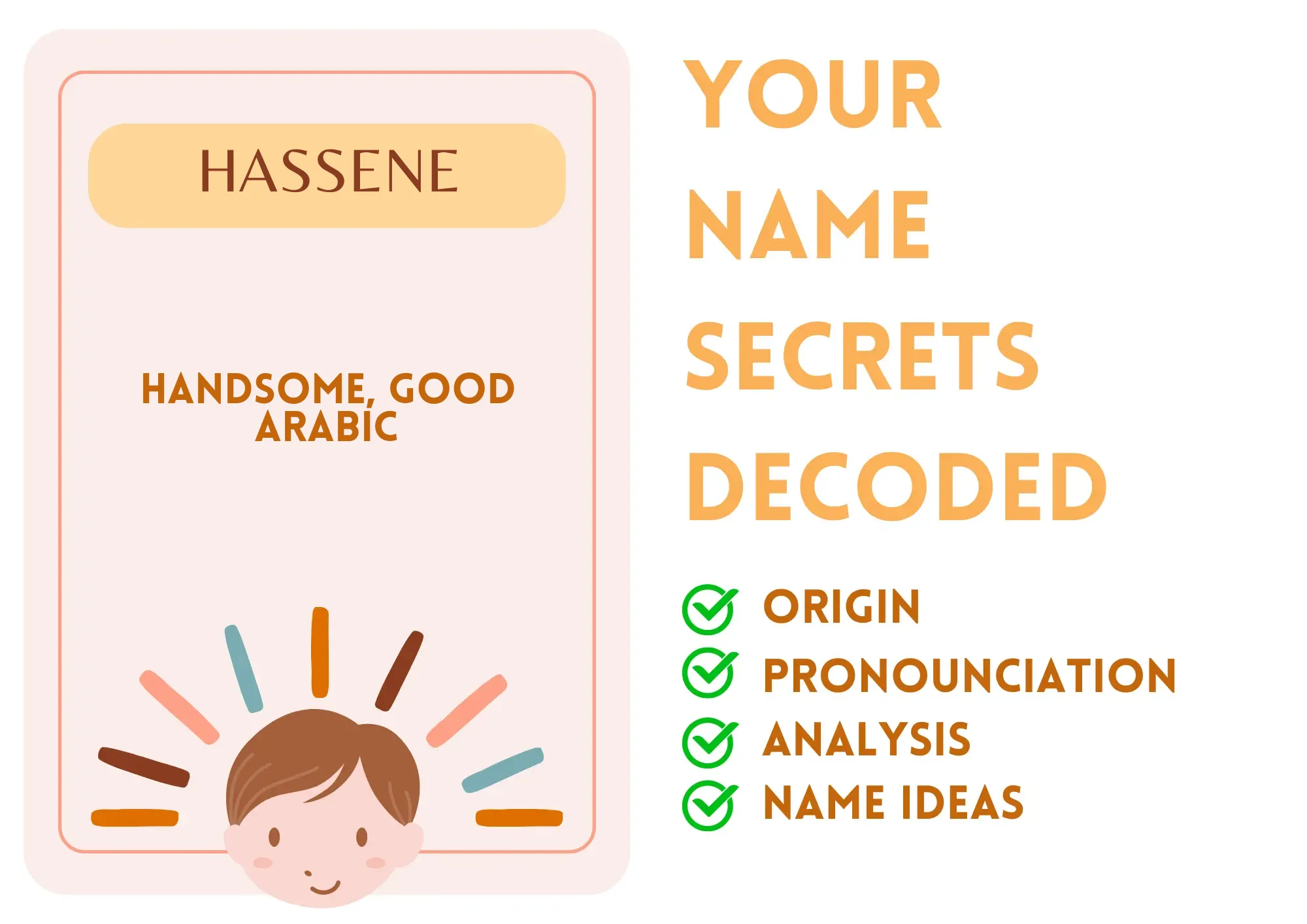
Hassene
Hassene is a name of Arabic origin, meaning 'handsome' or 'good'. It is used primarily in North African and Arabic-speaking countries, where it is appreciated for its aesthetic and positive connotations. The name is predominantly masculine, though it can sometimes be found in unisex contexts, reflecting the versatility of names in different cultures.
The name Hassene embodies qualities of beauty and goodness, and it is frequently used in Muslim communities, aligning it with cultural and religious significance. In Arab culture, the name conveys a sense of honor and virtue.
Hassene has historical significance, often appearing in Islamic texts and among notable figures in history. In popular culture, characters with variants of the name may signify charm and valor, reinforcing the positive associations the name carries.
The name tends to evoke positive feelings and is generally well-received, though it may sometimes be perceived as uncommon in non-Arab contexts. Writing and pronouncing the name is relatively straightforward, with common nicknames helping ease informal usage.
Basic Information
Gender: Boy
Sounds Like: ha-seen
Pronunciation Explanation: The first syllable has a soft 'ha' sound, followed by a clear 'seen' - emphasis is generally placed on the second syllable.
Summary and Meaning
Meaning: handsome, good (Arabic)
Origin: Hassene has Arabic origins, reflecting the linguistic and cultural richness of the Arab world.
Usage: Hassene is primarily a masculine name, celebrated for its positive meanings related to attractiveness and virtue.
Name Number (Chaldean)
Name Number (Pythagorean)
Popularity (Global Rank)
Overall: 42553
Boys: 37944
Most Popular in
Religious and Cultural Significance
Religion: Islam
Background: Commonly used within Muslim communities, Hassene signifies virtue and beauty, aligning with Islamic values.
Cultural Significance: In Arab culture, names like Hassene are chosen for their meaning and are often associated with noble attributes, emphasizing the importance of virtue and aesthetics.
Historical Significance: The name Hassene is historically significant among Arabic-speaking populations and is often associated with notable figures in Islamic history, thereby enhancing its resonance in both cultural and religious contexts.
Popular Culture
Literature and Mythology: Though not extensively featured in Western literature, names like Hassene may appear in Arabic poetry and stories, often depicting characters with noble qualities.
Movies and Television: Characters named Hassene or similar in films and series may represent a strong, charming individual, embodying attributes like kindness and beauty.
Feelings and Perceptions
Perception: Hassene is generally perceived positively, associated with beauty and kindness. Its unique sound may leave a lasting impression.
Positive Feelings: Charming, attractive, virtuous, culturally rich, noble.
Negative Feelings: May be challenging to pronounce for non-Arab speakers, perceived as unfamiliar in some regions.
Practical Considerations
Ease of Writing and Calling: Hassene is relatively easy to write and pronounce, consisting of seven letters and two syllables. It flows smoothly when spoken.
Common Typos and Misspellings: Hasen,Hassine,Hossen,Hacene
Common Nicknames: Hass,Sene,Hassi
Hassene Popularity
Hassene Usage and Popularity By Country
| Country | Rank (Overall) |
|---|---|
| Tunisia | 526 |
| Malta | 4819 |
| Slovakia | 6104 |
| France | 6936 |
| Finland | 7586 |
| Ukraine | 13157 |
| Belgium | 13545 |
| Saudi Arabia | 15505 |
| Qatar | 21780 |
| Italy | 22161 |
Hassene Usage and Popularity By City
| City | Rank (Overall) |
|---|---|
| Tunis | 448 |
| Paris | 5728 |
| Montréal | 6201 |
| Lyon | 5526 |
| Lille | 4906 |
| Monastir | 157 |
| Stuttgart | 4137 |
| Philadelphia | 18057 |
| Charleroi | 2923 |
| Sherbrooke | 906 |
Compatibility Analysis
Famous Persons Named Hassene
Related Names
Similar Sounding Names:
Hassan,Hassani,Asan,Hasan